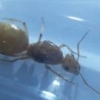I would start with something easier Tpro.
- Formiculture.com
- Forums
- Gallery
- Members
- Member Map
- Chat

I would start with something easier Tpro.
Camponotus, Solenopsis, Formica, Pogonomyrmex, stuff like that.
Actually, I recommend Tetramorium for a first time ant keeper, those are by far the easiest ants I have right now, and it can train you into a habit of feeding, cleaning, etc. They are also pretty fast growing, and as far as my experience goes, I do not think they have stingers or spray formic acid.
Actually, I recommend Tetramorium for a first time ant keeper, those are by far the easiest ants I have right now, and it can train you into a habit of feeding, cleaning, etc. They are also pretty fast growing, and as far as my experience goes, I do not think they have stingers or spray formic acid.
They spray formic acid, I had some of the wild colonies swarm all over me and it feels very irritating and painful. Also that is the species I started with and they all died, just the queens though. The next species of ants I kept were successful, I can't wait to move!
A Myrmicinae squirting formic acid? I do not think so.
A Myrmicinae squirting formic acid? I do not think so.
Crematogaster is a myrmicine, and the sometimes squirt formic acid.
Oh yeah... Dang I forgot that part.
A Myrmicinae squirting formic acid? I do not think so.
I am very sure that Tetramorium use formic acid, very sure, it hurts!
I remember when I put my hand onto a Formica mound. It did not hurt immediately, but then stung after! ![]() Maybe my Formica fusca will make a big colony like that- hopefully.
Maybe my Formica fusca will make a big colony like that- hopefully. ![]()
I remember when I put my hand onto a Formica mound. It did not hurt immediately, but then stung after!
Maybe my Formica fusca will make a big colony like that- hopefully.
Tomorrow I'm going to catch an insane amount of Myrmica rubra. ![]() With this species the more the merrier! I'm planning on making a super duper colony.
With this species the more the merrier! I'm planning on making a super duper colony. ![]()
I remember when I put my hand onto a Formica mound. It did not hurt immediately, but then stung after!
Maybe my Formica fusca will make a big colony like that- hopefully.
And I am probably going to when in a contest to see which F. fusca colony grows fastest. Currently are hibernating with 4 queens and 5 workers! ![]()
I have just one colony, with four workers and no brood... They seem to be ready to hibernate.
Ok, now lets quit derailing this thread, as this conversation could be an entire thread of it's own.
It is now. Try to keep the train on the tracks everyone. ![]()
Crematogaster is a myrmicine, and the sometimes squirt formic acid.
You took part in it too! ![]()
Tetramorium sting, but they only do so when their nest is disturbed. Only members of the subfamily Formicinae are able to produce formic acid. Ants from other subfamilies must make use of different chemical compounds.
As far as good species to start out with, I would recommend...
Tetramorium caespitum (sp. E)
Solenopsis spp.
Aphaenogaster spp.
Myrmica spp. (although I know some have had different experiences)
Camponotus spp.
Edited by Myrmicinae, October 24 2014 - 4:48 PM.
I still want to try and keep a. Versicolor. Fun fact A. Versicolor might be a tarantula
I would not attempt until I have kept a different species first. They are not the type of ant for someone who has never even kept ants before.
A Myrmicinae squirting formic acid? I do not think so.
Most myrmicine ants spray venom from their stingers, but not often in defense. Some do it in lesser quantities to sterilize brood, or as an alarm signal when gaster flagging, among other behaviors. I don't think alkaloid venoms, as are present in most myrmicines, contain formic acid, however.
Edited by drtrmiller, October 24 2014 - 5:49 PM.
0 members, 1 guests, 0 anonymous users